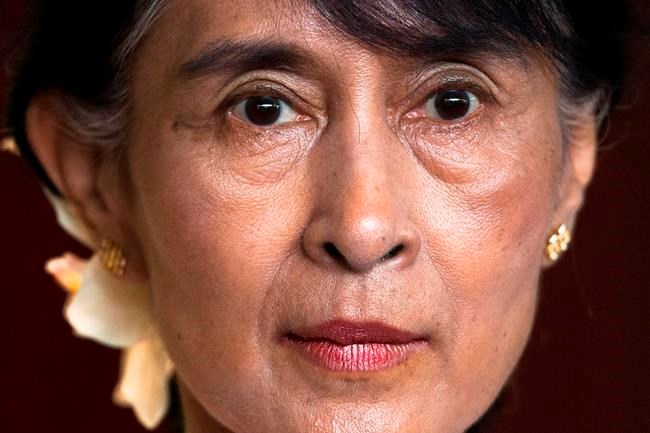BANGKOK (AP) — Myanmar’s military government on Thursday confirmed that ousted leader Aung San Suu Kyi has been moved to a prison compound in quarters separate from other detainees.
Suu Kyi was arrested on Feb. 1, 2021, when the army seized power from her elected government. She was initially held at her residence in Naypyitaw, the capital, but was later moved to at least one other location. For most of the past year, she has been held at an undisclosed location in Naypyitaw, generally believed to be on a military base.
Maj. Gen. Zaw Min Tun, spokesperson for the ruling military council, confirmed in a text message to journalists that Suu Kyi was moved on Wednesday to the main prison in Naypyitaw, where she is being held separately in “well-kept” circumstances. News of her transfer had been reported Wednesday but not officially confirmed.
He said Suu Kyi, having already been convicted in several cases, was transferred to the prison in accordance with the law.
A legal official familiar with Suu Kyi’s court proceedings said she is being held in a newly constructed building with three policewomen, whose duty is to assist her. Her ongoing trials will also be held at the prison, in another newly constructed facility. The official spoke on condition of anonymity because he is not authorized to release any information about her cases.
Suu Kyi, who turned 77 on Sunday, spent about 15 years in detention under a previous military government, but virtually all of it was under house arrest at her family home in Yangon, the country’s biggest city.
The secret location where she had been held for most of the past year was a residence. She had nine people to help her there, and was allowed to keep a dog that was a gift arranged by one of her sons, said another legal official, who also asked not to be named for fear or repercussions from the government.
The official said neither her assistants nor the dog accompanied Suu Kyi to her new prison quarters.
Suu Kyi is being tried on multiple charges, including corruption. Her supporters say the charges are politically motivated to discredit her and legitimize the military’s seizure of power.
She has already been sentenced to 11 years’ imprisonment on charges of illegally importing and possessing walkie-talkies, violating coronavirus restrictions, sedition and an initial count of corruption.
The prison where Suu Kyi is being held is slightly west of Naypyitaw. It was constructed in 2014 to temporarily hold detainees awaiting trial.
One of the legal officials said Suu Kyi’s first hearing in the new prison courtroom was held Thursday in the case of violating the Official Secrets Act.
Defense lawyers cross examined three prosecution witnesses but details of their testimony was not available. All of Suu Kyi’s cases have been held in closed hearings. Her lawyers are prohibited from discussing the proceedings.
Suu Kyi’s co-defendants in the case are Australian economist Sean Turnell, who had been her advisor, and three former Cabinet members.
Turnell is also being held at the same prison with Suu Kyi.
Suu Kyi is also being tried on 11 counts of corruption, each of which carries a maximum prison sentence of 15 years, and an election fraud charge, which carries a maximum sentence of three years.
The military’s takeover last year triggered peaceful nationwide protests that security forces quashed with lethal force, triggering armed resistance that some U.N. experts now characterize as civil war.
The ruling military council has said it plans to hold new elections around the middle of next year if circumstances permit. However, critics caution such polls are unlikely to be free and fair.
Tom Andrews, the U.N. special rapporteur on human rights in Myanmar, said Thursday that the military has been working hard to “create an impression of legitimacy” after ousting Suu Kyi’s government.
Suu Kyi's National League for Democracy party won a landslide victory in a November 2020 general election. The army claimed it seized power because the polls were marred by widespread fraud — an allegation was not corroborated by independent election observers.
“Any suggestion that there could be any possibility of a free and fair election in Myanmar in 2023 is frankly preposterous,” Andrews said at a news conference in Kuala Lumpur, Malaysia. “You can’t have a free and fair election if you locked up your opponents.”
Grant Peck, The Associated Press

